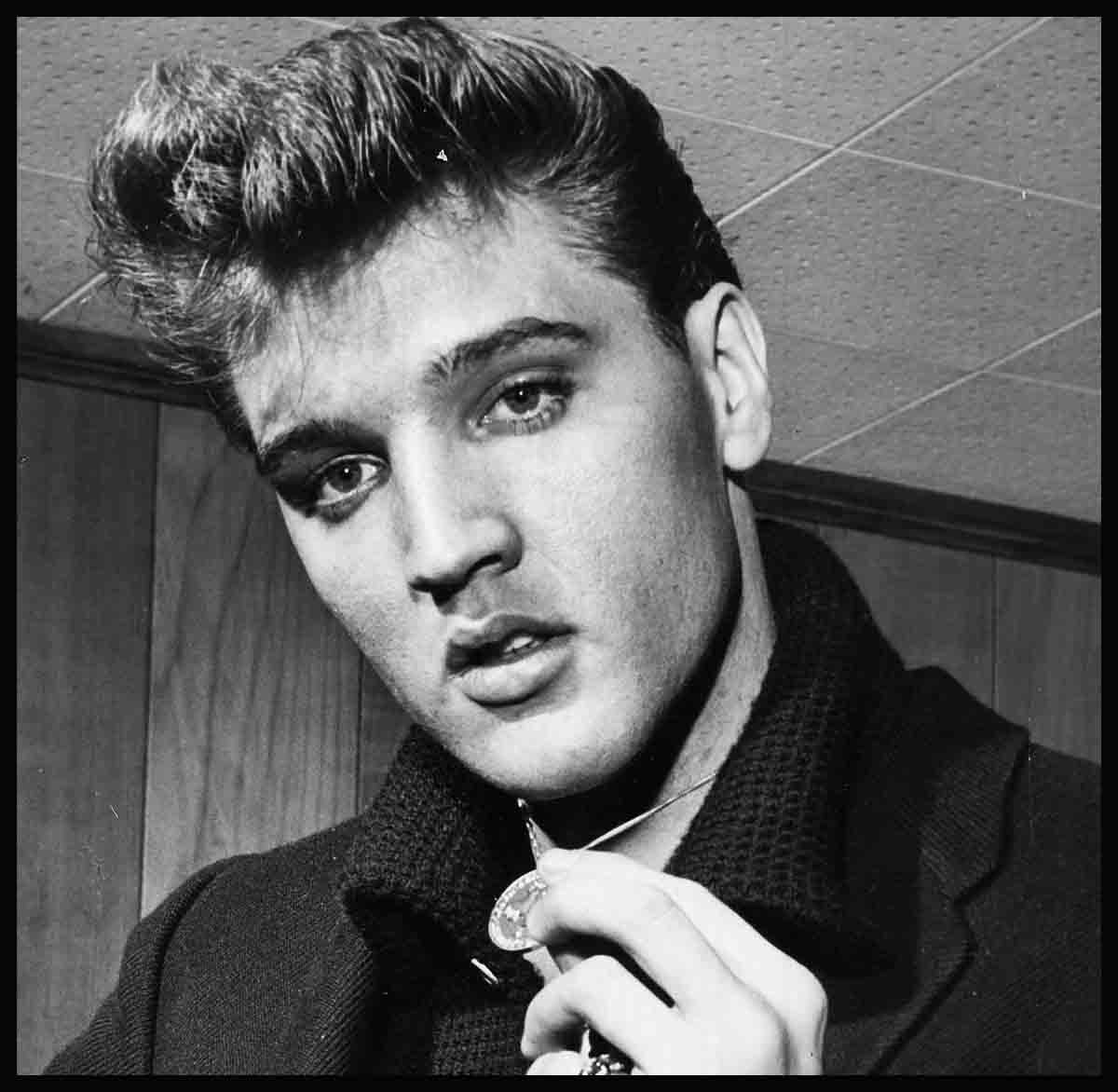
Elvis Presley Come Home
Comin’ into Memphis, folks. Can I brush you off, Mr. Presley?” Elvis grinned, squared his shoulders for the whisking, and fished in his pocket for a tip. . . . “Comin’ into Memphis.” . . . Comin’ home. . . . Feeling the train jerk beneath him, hearing it sigh and creak as it backed and pushed into the railroad yard, he was full of the same excitement and expectancy that had made him unable to eat breakfast when he’d come to Memphis as a little boy. Then, Memphis had been the biggest town he could ever imagine. It was bigger than Tupelo. It was even bigger than Corinth, Miss. It had dime stores with basements. It had a zoo and Clarence Saunders’ pink marble palace that was opened to the public after its grocery-magnate builder lost the property.
Pressing his forehead against the train window, Elvis felt the magic of Memphis again.
As a child, in East Tupelo, he didn’t travel much. His mother liked to keep him near her.
“I never saw a woman keep better track of a boy,” neighbors said.
And, besides, there wasn’t much money for traveling.
Playing in front of the white house in which he was born, he never did think much about the strange world of cities.
Sometimes, he’d follow the narrow road in front of his house around two bends to the highway that ran from Memphis to Birmingham.
“Which do you reckon is bigger?” one of his cousins asked, one day.
“Dunno,” he replied. “Memphis, I guess.”
Now, as his train chugged to a stop, thinking of all these things, he felt a moment of panic.
“Maybe I shouldn’t even get off,” he thought. “Gosh, I’ve seen so many places, been gone so long. Maybe everything has changed. I couldn’t stand being let down.”
“Memphis, all off for Memphis,” the conductor called.
Buttoning his coat against the outside cold, Elvis moved to the door.
There was a big crowd waiting for him at the station, and, to help him get through them and get home more quickly, they’d arranged for him to drive home in a police squad car. He smiled and waved at the crowd, grateful to them for being there, and for not forgetting him. And then the car started on its way toward home.

Home meant many things
When he had gone off to the Army, home had meant many things. It meant his mother, the quiet, proud woman whom he called “Baby” in moments of deepest affection. She’d died before he left for Germany, but she’d seen him off to the Army.
It had meant the great, square redbrick house on the edge of town with his own image wrought in the costly iron fence. He knew some people thought the fence an affectation, but he’d put it up as a symbol. Not many young men of his age, from such humble beginnings, could buy such a big house with such a fancy fence for their parents.
The fence had been an extra gift to Mom and Dad. At the time he’d ordered it, it had seemed important.
And Memphis, of course, meant the gang of fellows with whom he’d gone to school . . . Saturday nights at the White Castle hamburger stand . . . cruising down side streets with the crowd . . . talking about girls . . . swapping jokes . . . hanging around in front of the picture show with a sack of popcorn in one hand and an eye out for a pretty girl.
Home had meant, just before he went into the Army, sleeping late.
“I’ll sleep ’til noon tomorrow,” he said to himself.
That was part of being home.
When he awoke the next day, he couldn’t remember where he was. He’d been sleeping heavily, dreaming—what was it?—something about Friedberg and Col. Parker and a Hollywood sound stage. None of it was clear.
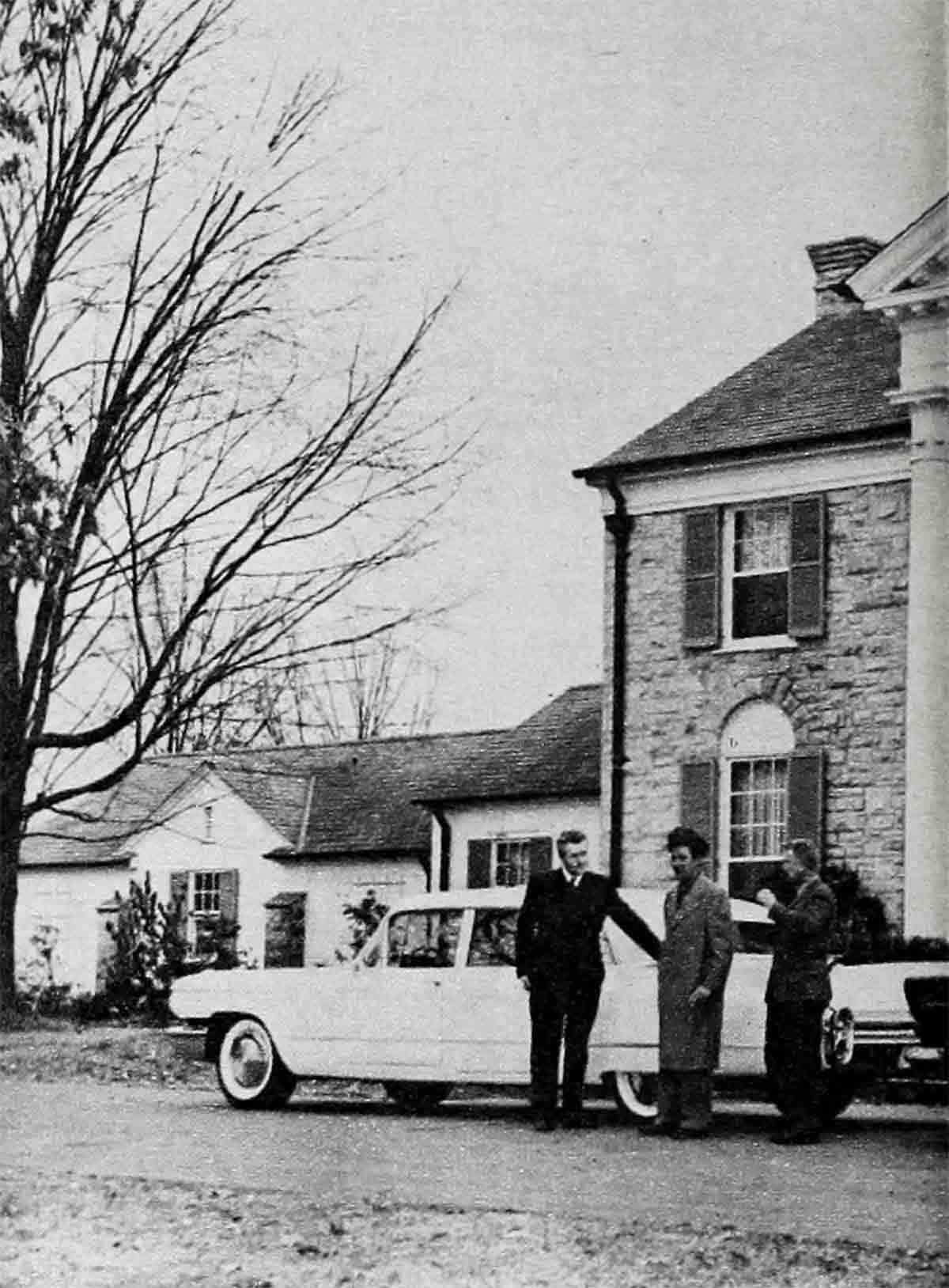
Rubbing his eyes, stretching, he tried to orient himself. Time and place were confused.
Then, sitting up, he saw the huge wall- to-wall mirror reflecting the room and the placard on one wall that read: “Let not your heart be troubled. Ye believe in God, also in Me. Jesus never fails.” In another corner stood a Christmas tree with a lot of toy Teddy bears and other gifts.
Sure, now he knew where he was. was home.
Sleepily, groggily, he let his mind wander. Thoughts were out of order. Probably Mom was already seeing about his lunch. Everything seemed awfully quiet, though.
But, as the idea entered his mind, reason dispelled it. He remembered, now. The house was filled with memories of Mom. He would never sell this house or move away from it, he thought.
Elvis flopped back onto the pillow and rolled over to look at the bedside clock. Five o’clock.
Five o’clock! Surely he hadn’t slept all day. He shook his head to clear it better. Downstairs, a noise at the back door sounded like the milkman.
Five o’clock. He’d awakened at 5 A.M. Army time! And was he hungry. He was so excited, though, that he forgot to eat for most of the day. It was hard to believe he was really home.
Being home, didn’t necessarily mean sleeping late, it seemed. How long would it take him to readjust to the old life? Would home ever be the same again? he wondered. How did one pick up old habits abandoned two years before?

Looking back
Later, after the town was awake, he drove to the city. About a mile from the town, on Highway 51, he stopped at Forest Hill Cemetery to visit Mom’s grave. Whenever he was home, he’d always go there at least once a week.
Snow, dirty because it was several days old, sat like white caps on telephone poles and lay in disconnected patches on lawns.
Back in home territory, snow reminded him of things he’d almost forgotten, things that snow in Germany and New York had failed to recall.
In Mississippi, when he was little, they’d had an ice-box that drained in a tub by the back door. He could tell how cold the day was by looking out at the ice on the drain tub. Sometimes, on cold, cold days, Mom would make boiled custard and set it on the back steps in a fruit jar. It would freeze just a little bit. Nothing tasted better.
Then, when it snowed, he’d make snow ice-cream.
“Add a little sugar and vanilla,” his grandmother directed.
That was good, too.
Braking in front of a hamburger stand, he began, for the first time since he got off the train, to feel really at home. How many times had he swung through the doors, whistling, feeling the change in his pocket and feeling proud because it was his. The first week he’d been paid as a truck driver, he’d stopped here for coffee.
He’d sat on the high stool, sipping hot java, and he’d grinned so broadly, the fellow next to him had noticed.
“What are you so happy about, son?” the fellow had said.
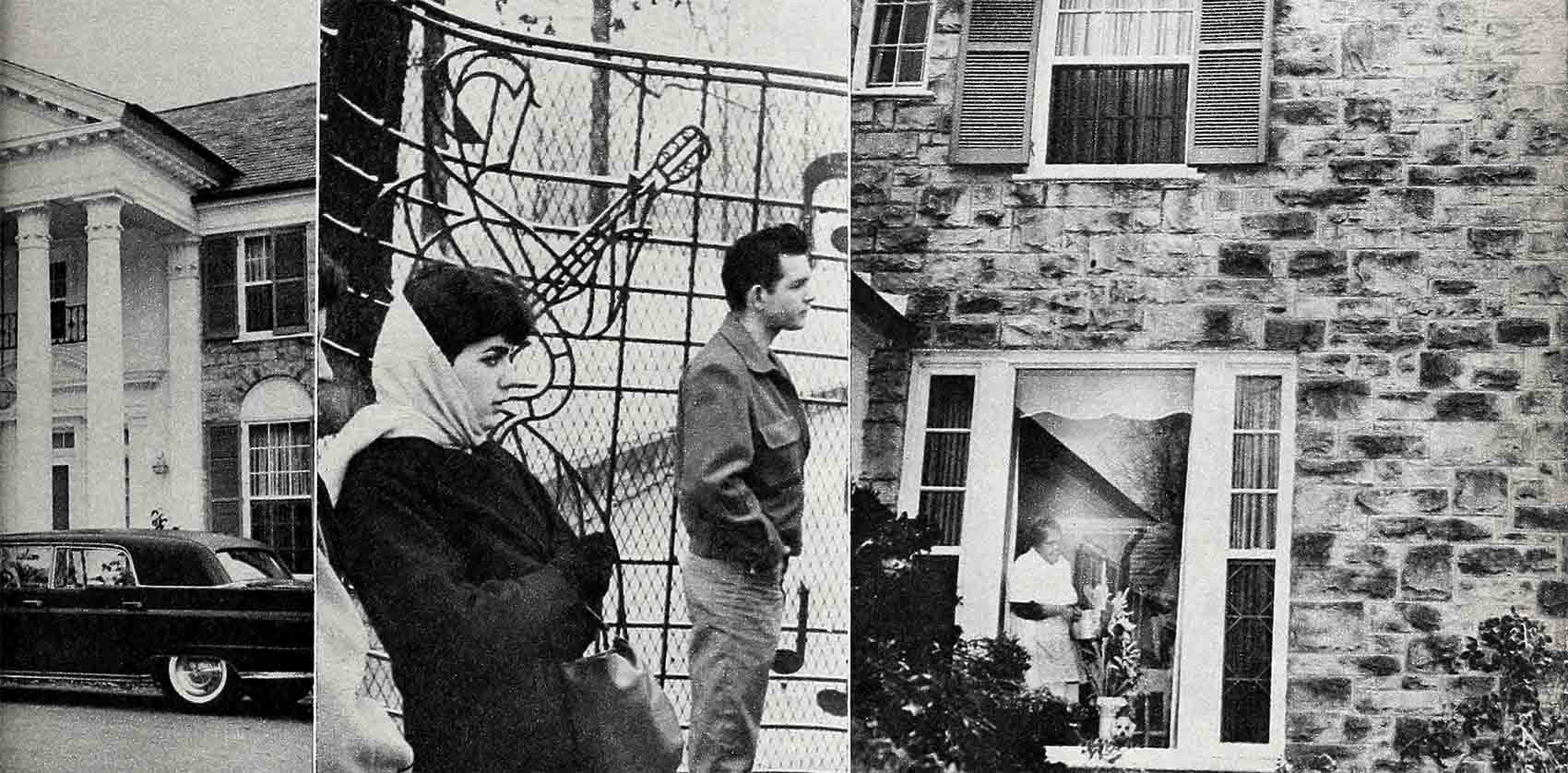
“I’m happy,” he said, “because I’m working. I just got paid. I feel good. I may even eat two hamburgers.”
This morning, his first day at home, he sat at the same lunch counter and felt good again—but not quite so good as he d with his new truck driver’s pay.
“I had all the confidence in the world, that morning,” he reflected. “I was working. I was a big man. There was nothing to worry about.
“Today—I’m not sure how everything is going to turn out.
“I wonder if I’ll ever feel as sure of myself again as I did when I was picking up my first pay check?”
He felt sudden pity for all the untried boys everywhere who hadn’t found out, yet, their own weaknesses.
Out on the sidewalk, he strode along the main streets of Memphis and looked at the buildings.
“It’s strange,” he thought, “I always remembered the main street as wider—all the time I was in Germany. And I thought the buildings were taller.”
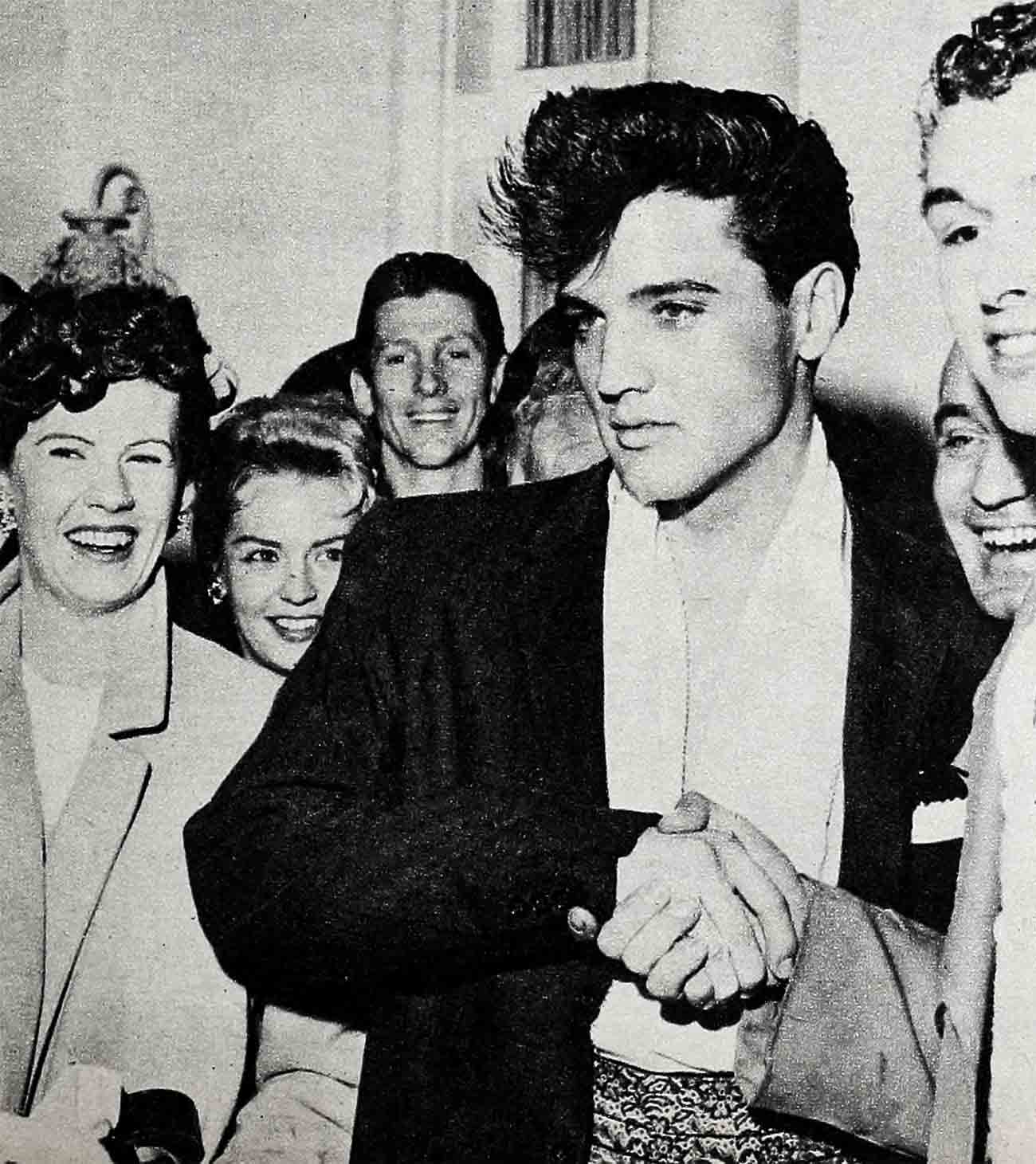

His folks
People passing on the street sounded funny. To him, brought up among Southern accents, a Southern accent sounded surprisingly novel, now. But, oh, how precious!
A little boy stopped him.
“Beg your pardon, suh, but do you know what time it is?”
“Going on nine.”
“Thank you, suh.”
The child scampered down the block.
What was it about that contact that gave him a twinge? He knew. It was the “suh.” The little boy had spoken in the way he’d been taught to speak as a child.
“Elvis,” his grandfather had said, “as far as you’re concerned, ‘Yes, sir’ is one word when you’re addressing your elders.
“And don’t you ever forget it.”
The familiar accents, the little boy who addressed him as “suh,” conjured memories that hadn’t occurred in years. He was swept by a wave of affection for everybody on the sidewalk.
When he was tiny, he’d been introduced to cousins thrice removed, to aunts by marriage, to courtesy aunts, to myriad family connections, and if he’d asked just what the connections might be, the answer was usually, “Why, Elvis; they’re some of your father’s folks.”
It didn’t take him long to realize that being some of his folks didn’t always mean there was a blood kinship. There was simply a common bond of understanding, culture, heritage based on a remote tie.
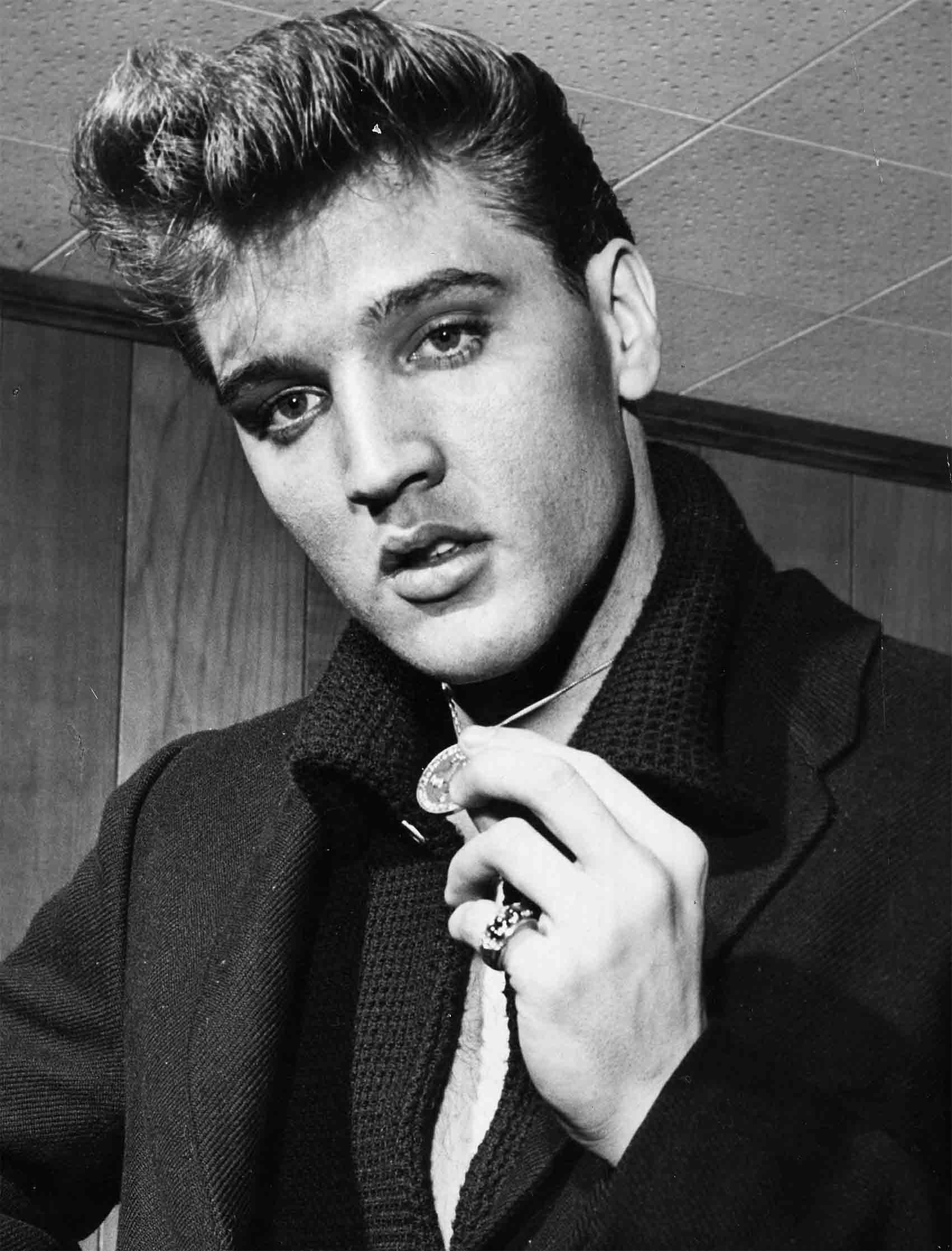
But genuine concern for one another was the cement that held the vast, loosely related clan together.
The people he passed on the streets, were from his home town. They, too, had eaten at the same hamburger stands, maybe gone to the same high school, swatted the same mosquitoes as he had.
Their soft accents were those of his East Tupelo cousins. He loved them all. They were his “folks.” He’d never understood this until today.
Without realizing it, he had taken the direction toward the Mississippi river. Shops and office buildings were giving way to warehouses. When a truck groaned out from one of these, he waved to the driver. The driver waved back and, again, he felt a kinship.
Truck drivers were friendly people—especially Memphis truck drivers. He was proud of having been one of the fraternity.
The mighty Mississippi
He could smell the Mississippi, now, and he remembered the first time he’d seen it.
His fifth grade teacher, Mrs. Grimes, had said to the class, “Elvis was in Memphis last weekend, and I’ll bet he saw the Mississippi river. Did you, Elvis? Would you like to tell the class about it?”
He was still living in East Tupelo at the time, and his geography class had been studying the Mississippi and its tributaries.
He had memorized the names of the tributaries and learned to spell them.
“Tell the class how the Mississippi looked,” Mrs. Grimes suggested.
“Well,” he hesitated, “it looked like—like a river.”
He didn’t want to tell the truth about it.
How would it sound to say, “To me, the Mississippi doesn’t look very big. It’s not as big as the Tennessee.”
Nobody would believe that. The class wouldn’t even believe he’d seen it. But that’s how his first look at the river had affected him.
Because the class had been studying the river, he’d asked his father to drive him across it the first thing when they got to Memphis.
As they mounted the long approach to the river bridge, he had craned his neck, straining for a glimpse of the flood. There’d be more water in a minute, he thought, than he could imagine.
But, when the river came into view, he was disappointed.
“Is that the Mississippi, sure enough?”
“You bet.”
“It doesn’t look so special to me,” he said, almost whispering.
Today, though, as he came in sight of the water, it seemed bigger than he’d remembered. No, maybe it wasn’t bigger. But it was different.
He looked at the Mississippi with an emotion he couldn’t analyze.
“Say,” a man on the river front said, approaching him, “aren’t you Elvis Presley?”
“Yes, sir, I am.”
“Well, I hear you been in Germany,” the man said. “Guess you’re mighty glad to get home. Guess it’s pretty good to see that river again.
“I know how it is. When I got home from France, first thing I wanted to do was see the river. Whatever else might have changed, I knew the Mississippi hadn’t.”
He nodded. He was trying to figure out why he felt differently about the river, today; why it looked bigger.
“Ain’t the size of the river that makes it so great,” the old man continued. “It’s what she stands for. She’s the very heart of the country.
“There’s nothing more American.”
“You’re right, I expect,” he said. “I never thought of it that way before.”
Walking back, toward town and his car, he wondered at himself.
“Everything’s the same, but it looks different. I never realized, before, how important some things are.”
When he turned into the gates at Graceland, he didn’t even glance at the fancy fence. Sure, he was glad he’d been able to buy a beautiful home before Mom died, but his pride in ability to buy, wasn’t the same.
“Baby,” he whispered, “I guess you know my Army record was good enough. I hope so. Maybe I owe some things to good luck, but whatever I am as a man, I owe to you.”
That night, he went out with his friends; the same crowd he’d introduced to Nick Adams, four years ago, when Nick visited him in Memphis.
When he stopped by their homes to get them, he was surprised at how modest some of the houses were. He’d never thought of them as cramped.
But the welcome he got from his friends and their parents, made him want to sing.
“Hey, El,” one of the boys shouted, “tell us about the German girls.”
“Well,” he began, “it was kinda funny when they couldn’t speak English. We would just sit and make funny signs at each other, or wave and giggle.”
“Could they dance rock ’n’ roll?” his friend asked.
“I guess so,” he answered. “But, you know, I can’t. I can slow dance a little, but I never bothered to learn to bop or anything like that.”
“Did you leave any girls behind?” someone else asked.
“No, not any specific ones,” he said. “There was one little girl, whose father was in the Air Force. I was seeing quite a lot of her, but there was no romance. The papers pictured her as the girl I left behind, but that wasn’t quite right.”
“Elvis,” everyone said, “we’re glad to see you. We’ve missed you.”
This was great, because he knew they were welcoming him as a boy they’d watched grow up, not as a famous personality. The welcome would have been the same for any old, valued friend just back from the Army.
“El, I thought maybe you would have changed, but you haven’t . . . not one bit. You’re just the same guy who went away. Isn’t that right, fellows? Isn’t that the same old El?”
“Oh, now,” he remonstrated, changes some.”
“No siree, you’re just the same.”
But he knew it wasn’t so.
“I’ll never again,” he thought, “be the boy they used to know. They aren’t the boys I knew. We’re men. Today, I’m beginning to find out the kind of a man I am.”
—BY NANCY ANDERSON
It is a quote. PHOTOPLAY MAGAZINE JUNE 1960




